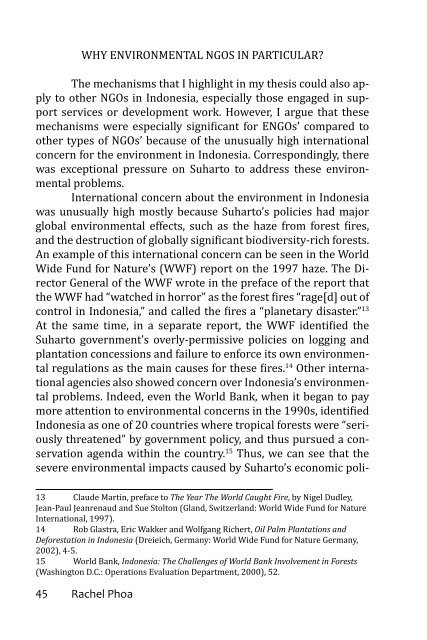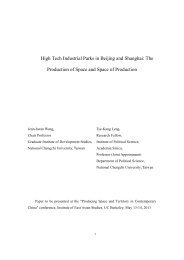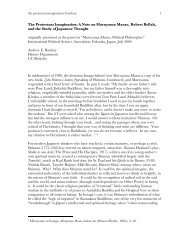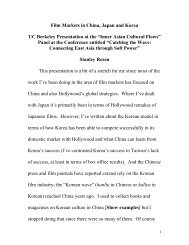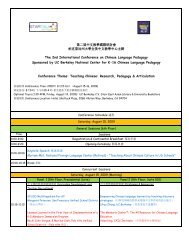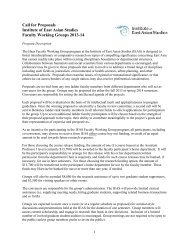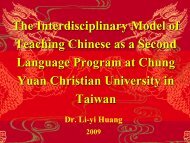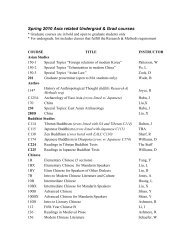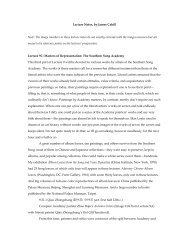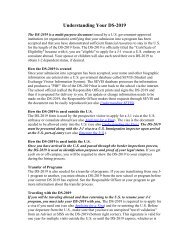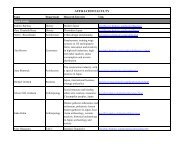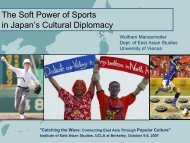Third Edition Spring 2013 - Institute of East Asian Studies, UC ...
Third Edition Spring 2013 - Institute of East Asian Studies, UC ...
Third Edition Spring 2013 - Institute of East Asian Studies, UC ...
Create successful ePaper yourself
Turn your PDF publications into a flip-book with our unique Google optimized e-Paper software.
Why Environmental NGOs in particular?The mechanisms that I highlight in my thesis could also applyto other NGOs in Indonesia, especially those engaged in supportservices or development work. However, I argue that thesemechanisms were especially significant for ENGOs’ compared toother types <strong>of</strong> NGOs’ because <strong>of</strong> the unusually high internationalconcern for the environment in Indonesia. Correspondingly, therewas exceptional pressure on Suharto to address these environmentalproblems.International concern about the environment in Indonesiawas unusually high mostly because Suharto’s policies had majorglobal environmental effects, such as the haze from forest fires,and the destruction <strong>of</strong> globally significant biodiversity-rich forests.An example <strong>of</strong> this international concern can be seen in the WorldWide Fund for Nature’s (WWF) report on the 1997 haze. The DirectorGeneral <strong>of</strong> the WWF wrote in the preface <strong>of</strong> the report thatthe WWF had “watched in horror” as the forest fires “rage[d] out <strong>of</strong>control in Indonesia,” and called the fires a “planetary disaster.” 13At the same time, in a separate report, the WWF identified theSuharto government’s overly-permissive policies on logging andplantation concessions and failure to enforce its own environmentalregulations as the main causes for these fires. 14 Other internationalagencies also showed concern over Indonesia’s environmentalproblems. Indeed, even the World Bank, when it began to paymore attention to environmental concerns in the 1990s, identifiedIndonesia as one <strong>of</strong> 20 countries where tropical forests were “seriouslythreatened” by government policy, and thus pursued a conservationagenda within the country. 15 Thus, we can see that thesevere environmental impacts caused by Suharto’s economic poli-13 Claude Martin, preface to The Year The World Caught Fire, by Nigel Dudley,Jean-Paul Jeanrenaud and Sue Stolton (Gland, Switzerland: World Wide Fund for NatureInternational, 1997).14 Rob Glastra, Eric Wakker and Wolfgang Richert, Oil Palm Plantations andDeforestation in Indonesia (Dreieich, Germany: World Wide Fund for Nature Germany,2002), 4-5.15 World Bank, Indonesia: The Challenges <strong>of</strong> World Bank Involvement in Forests(Washington D.C.: Operations Evaluation Department, 2000), 52.cies did indeed spark high international environmental interest inIndonesia.Suharto’s Reliance on ENGOs domesticallyInternational pressure on Suharto’s regime to deal with theenvironmental problems in Indonesia, combined with a decline inoil prices that hurt the government financially, led to two distinctmechanisms that constrained the regime from completely suppressingENGOs. First, in addressing the extensive environmentaldamage that it had caused, the Suharto government was requiredto rely on ENGOs’ resources and thus could not afford to eliminatethem. On the other hand, international support for these ENGOsfrom foreign governments and organizations that the Indonesiangovernment relied on for aid made it increasingly difficult for Suhartoto suppress these ENGOs. In this section, I present evidencerelating to the first mechanism.In the 1980s, as the result <strong>of</strong> a decline in oil prices, the Indonesiangovernment saw its debt burden increase significantly from6.7% <strong>of</strong> total expenditures in 1980 to 33.2% in 1988. As a result,it was forced to cut spending, and reduced non-aid developmentexpenditures from 38.3% <strong>of</strong> total expenditure in 1980 to just 13%in 1988. 16 This drastic cut in expenditure meant that relying onNGOs to provide services became an attractive alternative. 17 Thus,although the government “deeply distrust[ed]” ENGOs because <strong>of</strong>their advocacy activities, it could not completely suppress themdue to its reliance on their help in tackling environmental problems.18 Statements and actions by the Suharto government provideevidence that it came to realize that its own agencies could notsufficiently implement programs aimed at solving environmentalproblems without assistance from “intermediary organizations.” 1916 Hadiwinata, Politics <strong>of</strong> NGOs, 92-93.17 Philip Eldridge, Non-Government Organizations and Democratic Participationin Indonesia (New York: Oxford University Press, 1995), 30.18 Gordon, “NGOs, the Environment and Political Pluralism,” 17.19 Hadiwinata, Politics <strong>of</strong> NGOs, 92.45 Rachel Phoa Environmental NGOs in Indonesia 46


